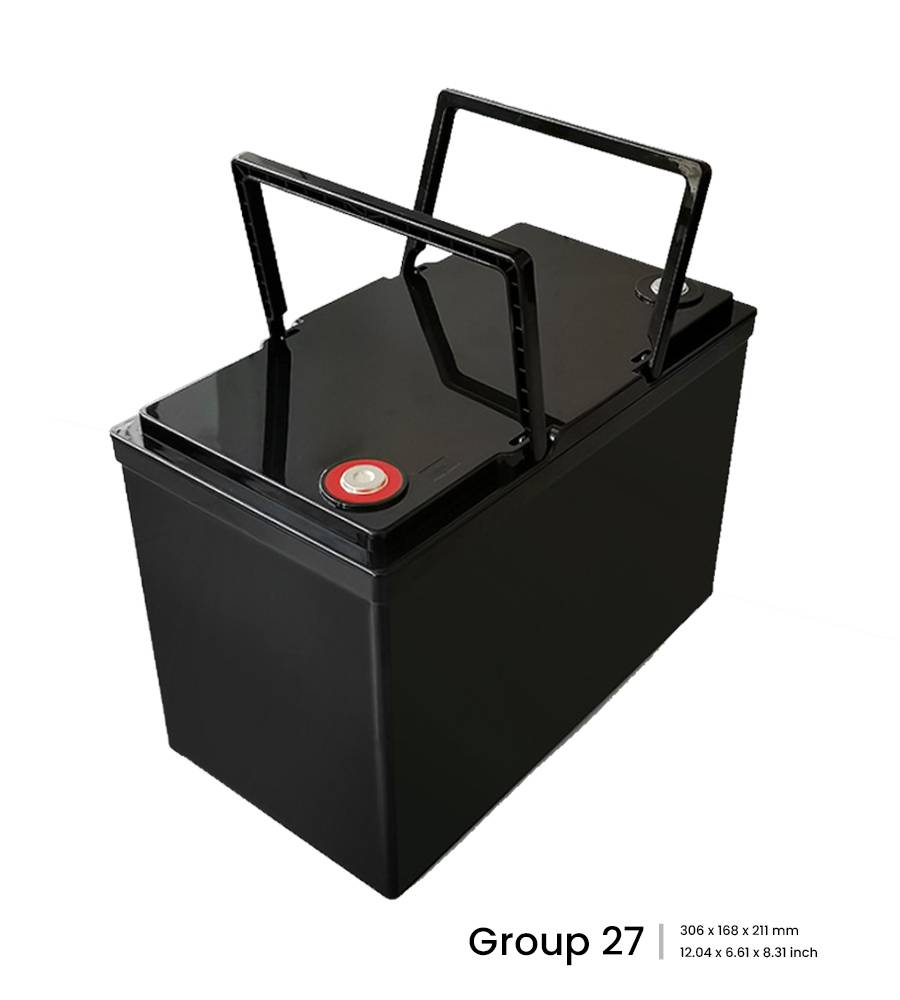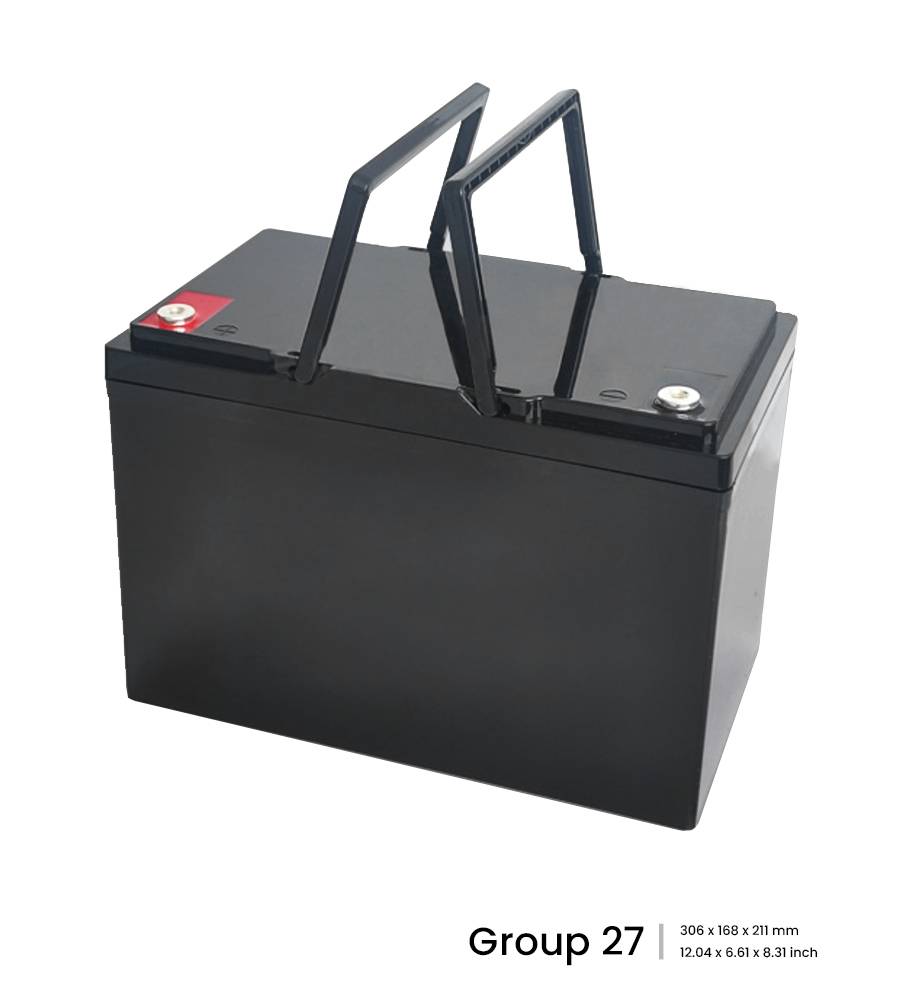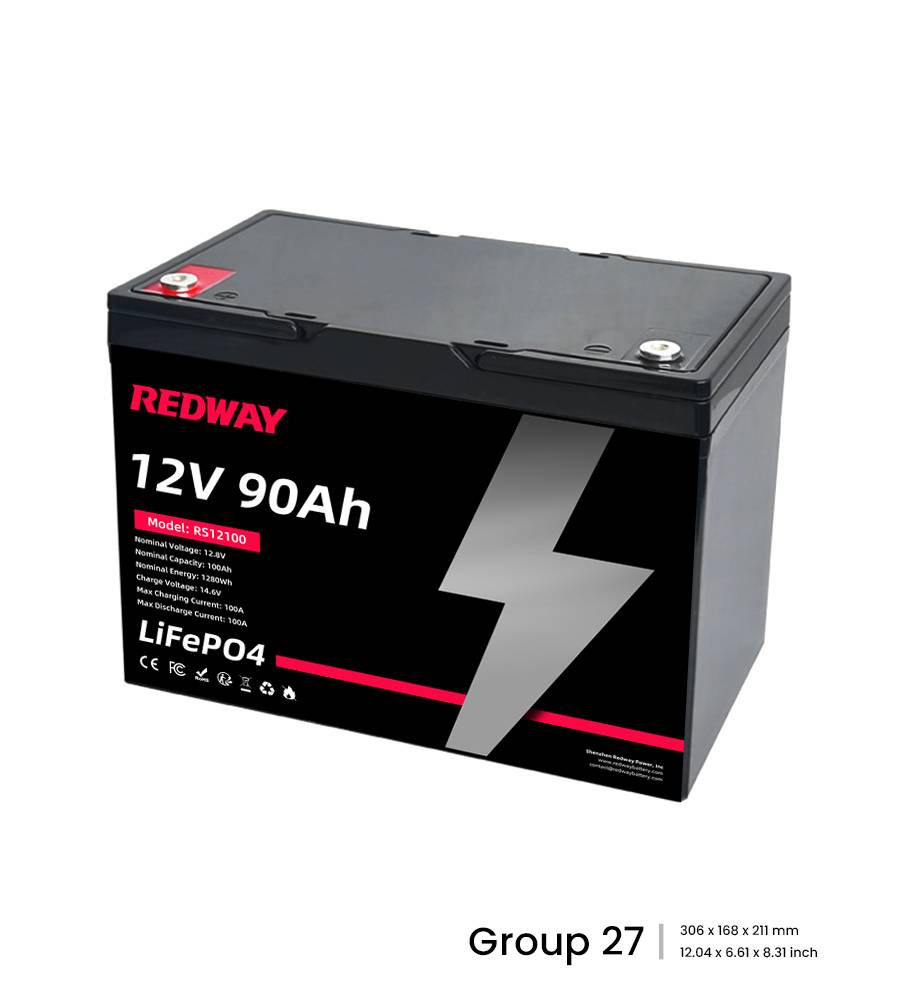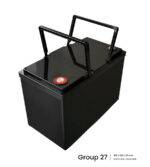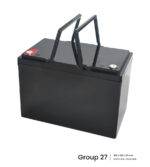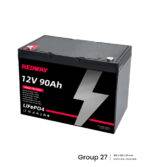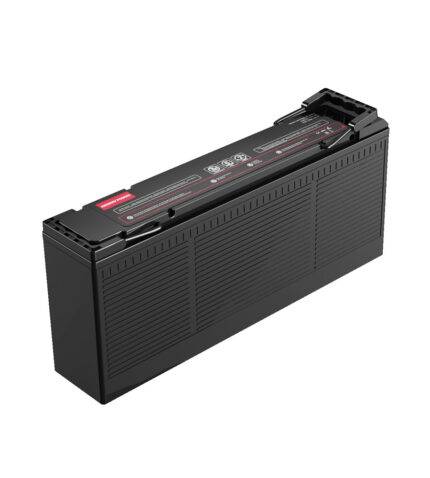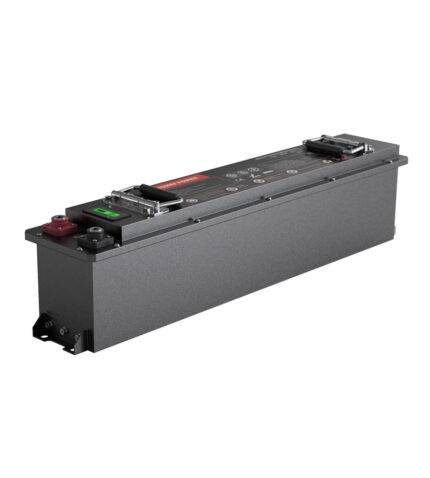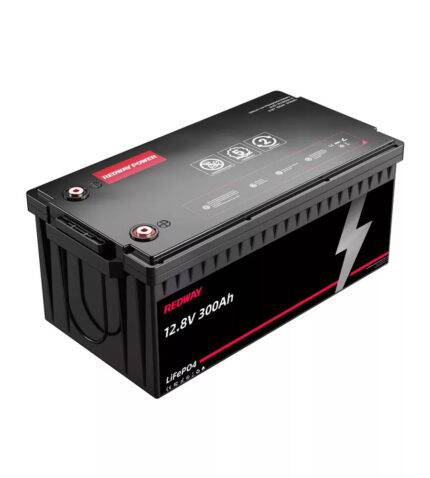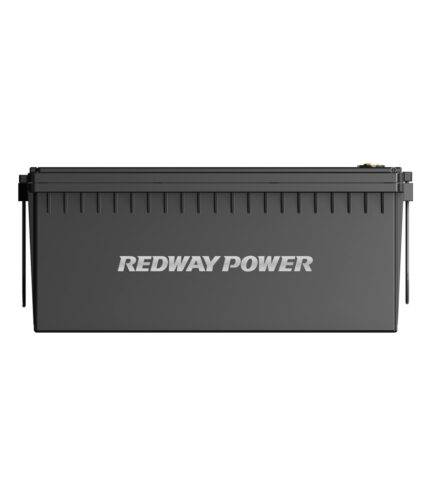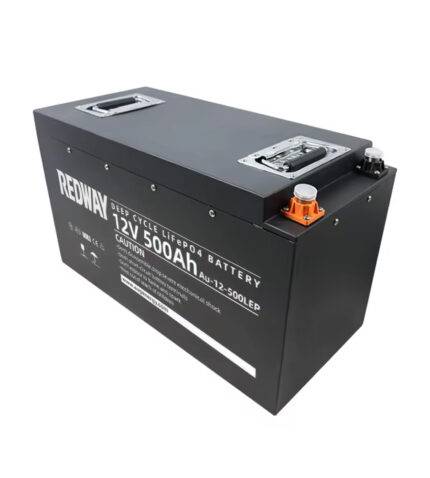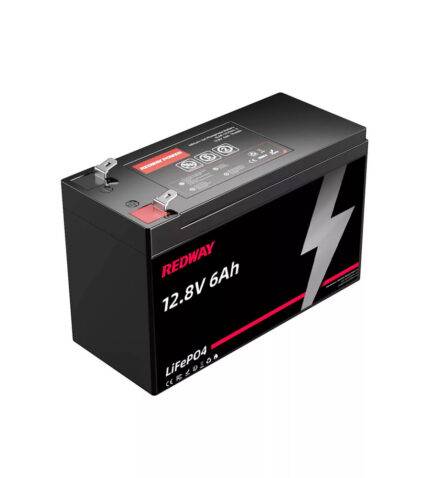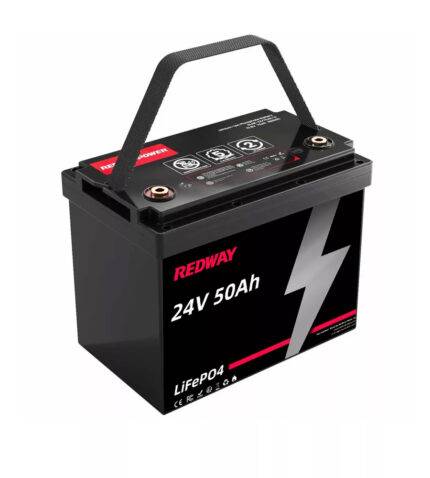12V 90Ah Lithium Battery (BCI Group 27)
• Cell: LiFePO4
• MOQ: 20
• Delivery: 20 Days
• Customizable / OEM / ODM: Yes
• Factory: Redway, Dongguan, Guangdong, China
• Delivery Terms: FOB, EXW, CIF
• Payment: T/T, L/C, PayPal
• Sea / Air / Land Shipment: 10FT, 20FT, 40FT, 60FT
Discover the Redway Power 12V 90Ah Lithium Battery, a cutting-edge energy solution designed for exceptional performance and longevity. Utilizing advanced Lithium Iron Phosphate (LiFePO4) technology, this battery provides reliable power for various applications. With a nominal capacity of 90Ah and a robust design, it is perfect for OEM, ODM, and wholesale buyers.
Key Features:
- High Energy Density: Delivers 1152Wh of nominal energy, providing ample power for demanding applications.
- Long Cycle Life: Capable of over 5000 cycles (80% DOD 0.5C), ensuring extended usage and value.
- Wide Temperature Range: Operates efficiently in temperatures from -20°C to 65°C, suitable for diverse environments.
- Low Self-Discharge Rate: Maintains a self-discharge rate of only 2% per month, ensuring readiness when needed.
- Customizable Options: Available for OEM/ODM projects, allowing tailored specifications to meet your unique requirements.
Product Description:
The Redway Power 12V 90Ah Lithium Battery is engineered for those who demand reliability and performance in their energy solutions. With a nominal voltage of 12.8V, this battery is built using Grade-A LiFePO4 cells, ensuring safety and stability. Its compact dimensions of 306 x 168 x 211 mm (12 x 6.6 x 8.3 inches) and lightweight design at just 8 kg make it easy to install in various applications.
This battery supports a maximum continuous charge and discharge current of 90A, making it ideal for high-demand situations. The robust construction features an IP65 rating, providing protection against dust and water ingress. With optional upgrades such as self-heating, Bluetooth connectivity, and solar compatibility, this battery can be tailored to fit specific needs.
Wholesale lithium golf cart batteries with 10-year life? Check here.
Backed by a 3-year warranty and compliance with multiple certifications including UL, CE, and RoHS, the Redway Power 12V 90Ah Lithium Battery stands as a trustworthy choice for automotive, renewable energy, marine, and backup power applications. Whether you are looking to stock up for wholesale distribution or seeking custom solutions for your brand, this battery is your go-to option for superior performance and reliability in the energy sector.

| 12V 90Ah LFP | Specifications |
|---|---|
| Lithium Cell | LiFePO4 (LFP) |
| Nominal Voltage | 12.8V |
| Nominal Capacity | 90Ah |
| Nominal Energy | 1152Wh |
| Max Charge Voltage | 14.6V |
| Discharge Cut-off Voltage | 10V |
| Max Continues Charge Current | 90A |
| Max Continues Discharge Current | 90A |
| Dimensions [L x W x H] | 306 x 168 x 211 mm / 12 x 6.6 x 8.3 inches / BCI Group 27 |
| Weight | 8 kg / 17.6 lbs |
| IP Rating | IP65 |
| Max Parallel Connections | 6 |
| Internal Resistance | ≤10mΩ |
| Cycle Life | >5000 cycles (80% DOD 0.5C) |
| Self-discharge | 2% (per month) |
| Charge Temperature | 0°C ~ 60°C |
| Discharge Temperature | -20°C ~ 65°C |
| Optional Upgrades | Self-heating / Bluetooth / App / WiFi / 4G / GPS / LCD display / RS485 / RS232 / CAN-bus / RJ45 / Solar MPPT / Active Balance / etc. |
| Charger | 14.6V 10A |
| BMS | JBD Smart BMS |
| Terminal | M8 |
| Battery Shell | ABS |
| Warranty | 3 Years |
| Silkscreen / Label / Laser Logo | Yes |
| User Manual | Yes |
| OEM / ODM | Yes |
| Shipment | Yes |
| Certifications | UL 1642, IEC 62619, CE, MSDS, UN38.3 |
Group 27 Lithium Battery Dimensions
What are Group 27 lithium battery dimensions?
Group 27 lithium batteries typically measure 8.3 inches (length), 6.8 inches (width), and 8.5 inches (height). These dimensions allow for compatibility with most marine and automotive applications that require compact power storage solutions.
How does 90Ah capacity impact runtime?
A 90Ah lithium battery provides extended runtime compared to smaller batteries. It offers more energy storage, which allows devices or systems to run longer before needing to be recharged, making it ideal for recreational vehicles or solar power setups.
Weight comparison of 12V 90Ah Li battery?
The weight of a 12V 90Ah lithium battery typically ranges from 22 to 30 pounds. This is significantly lighter than its lead-acid counterparts, making it a preferred choice for marine or RV applications where reducing weight is essential.
Charging specifications for 12V 90Ah lithium?
A 12V 90Ah lithium battery generally requires a 14.4V-14.6V charging voltage and a 10A-30A charging current for optimal performance. This ensures a faster charge and better battery life compared to lead-acid alternatives.
Cycle life of BCI Group 27 Li battery?
A BCI Group 27 lithium battery can provide over 2,000 to 5,000 cycles. This is significantly more than lead-acid batteries, offering a longer lifespan and reducing the frequency of battery replacements.
Compatibility with Group 27 lead-acid systems?
Most Group 27 lithium batteries are compatible with lead-acid systems. However, proper charging equipment and voltage regulators are necessary to avoid overcharging or damaging the lithium battery.
Automotive and Marine Uses for Deep Cycle Lithium Batteries
What are automotive marine uses for deep cycle lithium batteries?
Deep cycle lithium batteries are ideal for marine and automotive applications, offering reliable power for devices like trolling motors, RVs, and vehicles. Their lightweight and long lifespan make them excellent for continuous power use in harsh environments.
How do deep cycle lithium batteries outperform lead-acid batteries?
Deep cycle lithium batteries outperform lead-acid by offering longer lifespans, faster charging, and higher efficiency. They also weigh less, are more durable, and provide consistent voltage, unlike lead-acid, which tends to lose charge capacity over time.
What lifespan can deep cycle lithium batteries provide in vehicles?
Deep cycle lithium batteries can last up to 10 years in vehicles, significantly longer than lead-acid batteries, which typically last around 3-5 years. Their extended cycle life makes them a cost-effective investment for long-term vehicle use.
Are deep cycle lithium batteries safe for high-vibration marine environments?
Yes, deep cycle lithium batteries are highly resistant to vibrations, making them suitable for marine environments. Their rugged design ensures safe and reliable performance even in high-vibration conditions, reducing the risk of battery failure.
What charging requirements apply to deep cycle lithium batteries?
Deep cycle lithium batteries generally require a 14.4V to 14.6V charging voltage with a 10A to 30A current. Using a compatible charger helps optimize battery health, performance, and lifespan over time.
How to maintain deep cycle lithium batteries in automotive applications?
To maintain deep cycle lithium batteries in automotive applications, regularly inspect for damage, ensure proper charging and discharge cycles, and keep terminals clean and corrosion-free. Proper maintenance improves battery lifespan and performance.
China OEM Group 27 Lithium Battery Customization
What is China OEM Group 27 lithium battery customization?
China OEM Group 27 lithium battery customization involves tailoring the battery's specifications to meet specific needs, such as capacity, voltage, or physical dimensions. This service is widely used by businesses seeking high-performance power solutions in industries like automotive and solar energy.
What are specifications of Group 27 lithium batteries?
Specifications for Group 27 lithium batteries generally include a 12V voltage, 90Ah to 100Ah capacity, and dimensions that fit standard marine or automotive applications. They are known for lightweight and high efficiency.
How does OEM customization enhance lithium battery solutions?
OEM customization allows businesses to create tailored lithium battery solutions that align with specific needs like battery life, size, and capacity. This improves overall efficiency and reduces operational costs, ensuring optimal performance.
What industries use China OEM lithium battery customization?
Industries such as automotive, solar, and marine frequently use China OEM lithium battery customization to enhance the performance of electric vehicles, solar panels, and trolling motors, providing better energy efficiency.
How does OEM differ from ODM in lithium battery manufacturing?
OEM (Original Equipment Manufacturing) focuses on producing batteries based on a specific design or specification provided by the client, while ODM (Original Design Manufacturing) involves creating the product's design and manufacturing it. OEM offers more customized solutions, whereas ODM provides more innovative designs.
What materials optimize customized lithium battery performance?
To optimize lithium battery performance, manufacturers use high-quality lithium iron phosphate (LiFePO4) cathodes, graphite anodes, and durable electrolytes. These materials ensure the battery's safety, longevity, and energy density.
UL Certification and LiFePO4 Batteries
What is UL certification for LiFePO4 batteries?
UL certification ensures that LiFePO4 batteries meet stringent safety standards set by Underwriters Laboratories. This certification guarantees that the batteries are safe, reliable, and compliant with global regulations.
How does 12V 90Ah capacity affect performance?
The 12V 90Ah lithium battery provides more power for longer durations compared to smaller batteries. Its higher capacity improves runtime, making it ideal for use in recreational vehicles, solar energy systems, and marine equipment.
What applications suit 12V 90Ah LiFePO4 batteries?
12V 90Ah LiFePO4 batteries are ideal for applications like solar power systems, electric vehicles, and marine environments, where a stable and long-lasting power source is required. Their compact size and efficiency make them versatile across various industries.
Are UL-certified LiFePO4 batteries safer alternatives?
Yes, UL-certified LiFePO4 batteries are considered safer alternatives to lead-acid batteries due to their better thermal stability, non-toxic properties, and fire resistance. They also offer a longer lifespan and higher efficiency.
How to maintain a 12V 90Ah LiFePO4 battery?
Maintain a 12V 90Ah LiFePO4 battery by keeping it clean, checking connections, and using a compatible charger. Avoid deep discharges and store the battery in a cool, dry place for optimal battery life and performance.
Why choose LiFePO4 over lead-acid batteries?
LiFePO4 batteries offer longer lifespans, faster charging, and higher efficiency compared to lead-acid batteries. They are also more environmentally friendly, lighter, and safer, making them ideal for long-term energy solutions.
Lithium vs Lead-Acid Battery Comparison
Size and weight differences between Group 27 batteries?
Group 27 lithium batteries are typically lighter, weighing between 22 to 30 pounds, while their lead-acid counterparts can weigh up to 60 pounds. The significant weight difference makes lithium batteries easier to handle and more efficient for various applications.
Energy density comparison: Lithium vs Lead Acid?
Lithium batteries have a higher energy density than lead-acid batteries, meaning they can store more energy in a smaller size and weight. This makes them ideal for space-sensitive and weight-critical applications like marine and automotive systems.
Lifespan cycles for lithium and lead acid batteries?
Lithium batteries typically offer 2,000 to 5,000 cycles, while lead-acid batteries last only about 300 to 500 cycles. This makes lithium batteries much more cost-effective and durable over the long term.
Maintenance requirements for each battery type?
Lead-acid batteries require regular maintenance, including watering and cleaning, while lithium batteries are maintenance-free. This makes lithium batteries more convenient and cost-effective, with fewer upkeep requirements.
Cost differences over total lifespan?
While lithium batteries have a higher upfront cost, their longer lifespan and lower maintenance costs make them more economical over time. Lead-acid batteries, although cheaper initially, require frequent replacements and maintenance, leading to higher total costs.
Environmental impact of lithium vs lead acid?
Lithium batteries have a lower environmental impact due to their recyclability and fewer toxic materials. In contrast, lead-acid batteries contain harmful lead and require special handling for disposal. This makes lithium a more environmentally friendly option.


